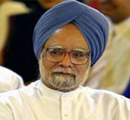
Spiralling of price rise haunts more to poor are a widespread belief. But, more than poor it haunts the government if it is approaching for the election. Inflation, OBC reservation excluding creamy layer and women’s reservation bill are the key issues over which the government would likely to be encircled by the oppositions as well as its own allies the Left parties in the ongoing Parliament session, which resumed on Tuesday.
Inflation, the most worried issues this time for the ruling government, which was on a constant rise from a year, was noted 6.68 percent on 15 March, and rose to a three-year’s high of 7.41 percent on March 29.
Earlier at the time of presenting budget for the next fiscal on February 29, the Finance Minister P Chidambaram had accepted the higher inflation rate was the outcome of higher prices of fruits, vegetables, oilseeds, meats, and milk. He said that government had targeted to bring the inflammation rate down at around four percent for the current fiscal.
The current inflation owing to spiralling price rise of food products, iron ore and steel prices, which has crossed its three-year’s high a fortnight ago is completely against what RBI Governor Y V Reddy said after the post-budget meeting with the finance minister that the budget was broadly consistent with the overall objectives of achieving growth along with price stability. The current inflation rate of 7.41 percent has infringed the statement what the RBI governor had issued earlier.
The Prime Minister too has accepted that spiralling of price rise has such a capacity to impediment the economic growth. Rising food prices and the persistent food shortage has the capacity to derail our endeavour to promote reforms and will make inflation control more difficult, he said.
However, the government has adopted several significant measures to curb inflation like barred the cement export, curbed the incentive on the steel export, banned the export of non-basmati rice and raised the minimum export price for basmati to 1,200 dollar per tonne from 1,100 dollar per tonne. It has also extended the bar on pulses for one more year till 2009. Duties on hydrogenated vegetables fats, palm oils, and sunflower oils are also cut.
Despite that nothing much has put effect on price rise as prime minister also said that price rise is not only caused by domestic reasons but also caused by the impact on international market like dollar depreciation value and rise in prices of crude oils.
One reason of spiralling price rise also came in light in recent days of hording of cereals and its black-marketeering in Delhi after the State government busted some of the godowns, where the hording of food products were kept illegally.
However, it is true as Manmohan Singh said, “we need to increase supply side to meet the rising demand.”
Besides these measures, the central bank could increase the cash reserve ratio (CRR) in a bid to curb high inflation. But this practice is taken by the RBI as a last option.
The UPA government is completely finding itself in the position of bewilderment as the price rise issue may go against the ruling Congress in the forthcoming general elections, which is scheduled to be held in the second quarter of next year.
On the second issue of women reservation in Parliament, the UPA chairperson Sonia Gandhi few days ago had said that her government would try to present bill in the Parliament session and try her best to pass it. But to pass the bill would be an immense challenge to the UPA government.
On the third issue of Supreme Court’s nod for upholding government’s bid to 27 percent reservation for OBCs in institutes of higher central education comprising IITs and IIMs could be considered a gain for the Centre superficially. As the Supreme Court has clearly pointed out that “creamy layer” among OBCs must be excluded from the benefit under this scheme. The Court in its statement also had said the reservation on the basis of 1931 census could not be a determinative factor for identifying the OBCs. So the only need now is to implement it under fresh identification, as identification on the basis of 1931 is completely unacceptable and impractical.
Now, if the government goes ahead avoiding the Apex Court guidelines about creamy layer, it could be faced nationwide agitation. Moreover, on the issue of creamy layer the cabinet ministry itself has conflicting views.
In these circumstances it seems that UPA government would face utmost difficulty ahead in the ongoing Parliament session commenced from April 15 and these factors could also be decisive for the Congress in the next year’s general elections and some State’s Assembly elections due to be held this year.
|
|
Read More: Delhi


Comments: